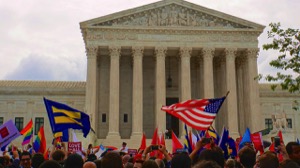
My mindset began binary. During the early years of my coming out journey, I felt it mandatory to choose a label within the LGBT acronym. I feared being seen as confused or uninformed and sought to fit in. I needed to convey to others that I was not straight, and I saw the L, G, and B as clearly expressing this. Over the years, I used each descriptor, trying to find my perfect fit.
The moment I recognized and embraced my attraction to women, I immediately branded myself with that B. I was insistent upon shedding the skin associated with the word straight. Using the word bisexual achieved that in the exact way I needed at the time. As a bisexual woman, I could be a member of the LGBT community, without losing my ability to relate to my straight female friends. A freshman at a college where I knew no one, I selfishly needed my hold in each world.
Time passed, and I deepened my sexual and romantic exploration. The longer I dated women, the less the label bisexual fit. Alternative descriptors still seemed alienating, yet the L and G options felt a bit too narrow for the way I was experiencing my attraction. Despite that, I used the term gay, defining it in my mind to mean “the opposite of straight.” It wasn’t that I was unaware of other options; I was simply bogged down by the exhaustion of having to constantly explain myself to others and stifled by fear that my identity would not be taken seriously if I didn’t use an obvious marker.
The first time I heard someone in the community use the word queer to describe another member, my reaction was visceral. Despite the show Queer as Folk playing an instrumental role in my coming out journey, I still lowered the volume of my voice when speaking the first word in that trio. This discomfort stemmed from a place in my psyche created by the cruel pejoratives of high school bullies, a word I knew could be a dangerous weapon. I feared giving power back to the very people who made me feel powerless for so long, not yet comfortable with the concept of reclaiming language.
What permission did I have to use this word? Did I have a claim? I loved the beauty of a broad and inclusive term, while equally fearing judgment for speaking it out loud. I waited for someone to give me the green light; when no one did, I finally gave it to myself. I cast my vote in Maryland, becoming a part of the majority that passed marriage equality for that state. I then stood on the footsteps of the Supreme Court as this equality extended to every state. I became a part of our history. I found my footing.
I opened my eyes completely to the cruel agenda of our oppressors. I was no longer the 18-year-old girl who was lucky enough to have every person in her life respond with acceptance when she told them she was bisexual. I saw the fight it took for so many members of our community to be valid. If I was afraid of a word, if I let five little letters scare me, how could I be the advocate we needed? I grabbed the word queer, and I melded it with my existence. Who I was made certain people uncomfortable regardless of the language I used; there was no reason to shy away. I chose to go all in, and I intend to stay that way.











